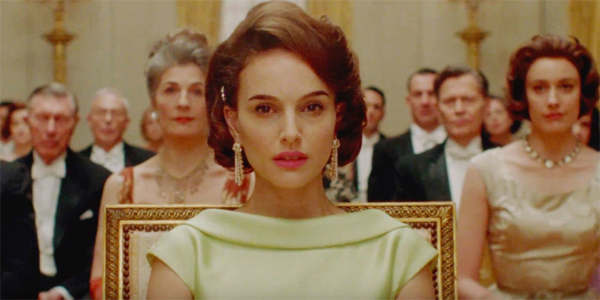Jackie Review
Jackie is a remarkable film that’s equal parts a devastating portrait of indescribable grief and a lesson on the nuts and bolts of myth making and legacy building. It takes place on a personal level — intimate, intrusive, uncomfortable — but it has national and even international implications. That scope feels appropriate considering the “American-ness” of the film’s subject, former first lady Jacqueline Kennedy, and the perspective of its creator, Chilean director Pablo Larrain (No, Neruda).
The Kennedys are the closest thing Americans have to royalty (for now), but Jackie peels back the curtain visually, aurally, and thematically in ways that are prickly and alienating, but also extremely layered and thought-provoking. It covers a ton of ground in a startlingly short amount of time, and the glue that is Natalie Portman’s career-best performance binds all of the thematic and technical achievements and elevates the final product into year-best consideration.
President John F. Kennedy was shot and killed in Dallas on November 22, 1963. We see his wife, Jackie (Portman, natch), dressed in her blood-stained pink Chanel suit — maybe one of the most famous articles of clothing in American history — wrestling with the overwhelming shock of losing a husband and, as one character puts it, a father to the nation. She must inform her children that their father isn’t coming home. She needs to quickly decide where they’ll live, and she’s forced to say goodbye to a home she loved and never was able to finish making her own.
She also must plan a funeral so grand and worthy of her husband that it cements his place in history as a headline (like Lincoln), not a footnote (a la Garfield or McKinley). This means horses, bagpipers, heads of state from more than 100 countries, and a multi-day procession from the White House to the Capitol and finally Arlington. Attorney General Bobby Kennedy (Peter Saarsgard) is a rock throughout it all, but even he has his moments when the thought of what he and his brother didn’t accomplish overwhelms him.
Most of the film is framed through conversations between Jackie and an unnamed journalist (Billy Crudup), who’s looking to report on something, anything, that even approaches the truth of what Mrs. Kennedy was experiencing and feeling in the days immediately after her husband’s assassination. Of course, Larrain and the prying, almost Malick-ian camera of his cinematographer, Stéphane Fontaine, are showing us just that. It’s a clever way of setting everything up, and it pays off in a big way as the film reaches its conclusion. I also wouldn’t have minded if the film was simply a tête–à –tête between these two exceptionally talented actors. The rest of Jackie is phenomenal, but the sequences between these two could have been a brilliant stage play. Her almost disdainful unwillingness to play by his rules couples perfectly with his more gentle uneasiness to go by hers.
It’s impossible to discuss the film any further without diving headfirst into Portman’s performance. In the Crudup scenes, she’s a great deliverer of dialogue. Throughout most of the rest of the film, it’s her expressions that do the talking. She looks the part well enough and matches Mrs. Kennedy’s interesting vocal cadence with some skill. But it’s the physical vulnerability she displays — the way she walks around with a vase she’ll never get to fill with flowers, or the way she tosses her daughters dolls aside — that hit me hardest. It’s clear Mrs. Kennedy had trained herself well for the physical rigors and demands of the job of First Lady, but she’d received no training for this moment, and watching the facade stay in place when everything around her is screaming for collapse was both brutal and surprisingly inspiring. Portman deserves a ton of credit for this film’s success. It’s the best thing she’s ever done.
The film’s other key feature is Mica Levi’s otherworldly score. She earned quite a bit of acclaim for her work scoring Jonathan Glazer’s Under the Skin (which really is an otherworldly film). If you’re familiar with that film and its score, you might think Jackie an odd fit for her style, but it’s such a defining characteristic of Larrain’s film and brilliantly complements his thesis.
I’ve been a fan of Larrain’s work for some time, but I wasn’t sure he had a film like this in him, never mind pulling something monumental off with his English-language debut. Much has been made of 2016 being a terrible cinematic year; I’m guilty of saying it myself. But any year that turns out something as immensely and achingly sad, as strikingly directed, or as well acted as this movie can’t be dismissed or diminished.
















One Response to Jackie Review